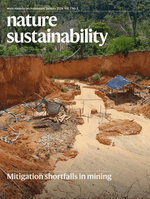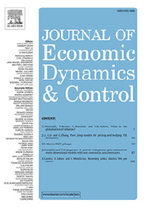Why has productivity slowed down?
Researchers from the Oxford Martin School have identified a combination of factors driving a slowdown in productivity post-2005 in five advanced economies.
Fresh thinking in economics is urgently required to address the most critical challenges of our time, ranging from managing systemic financial crises, to reinvigorating economic growth, addressing rising inequality, encouraging economic development, and developing new models of long-term sustainability.
We, the Institute for New Economic Thinking at the Oxford Martin School (INET Oxford), are dedicated to applying leading-edge thinking from the social and physical sciences to global economic challenges.
Our aim is to stimulate innovation and debate in economics, support visionary interdisciplinary research, and radically redefine the education of the next generation of economists, and business and government leaders.
INET Oxford includes over 60 affiliated scholars from disciplines that range from economics, to sociology, anthropology, philosophy, business, and law and from across the University of Oxford, including the Saïd Business School, Department of Mathematics, Department of Economics, and Department of International Development.
This gives us a unique ability to bring multiple perspectives to bear on problems such as how to make the global financial system more robust and resilient; re-invigorating economic growth and innovation; addressing rising economic inequality; how to create a model of environmentally sustainable economic growth; and how economics should be taught to the next generation of leaders.
INET Oxford researchers work closely with policy-makers and leaders in business and civil society to bring new economic ideas and thinking into debates and practice in the public, private and non-profit sectors.
Researchers from the Oxford Martin School have identified a combination of factors driving a slowdown in productivity post-2005 in five advanced economies.
The ambition of policymakers navigating the energy transition has surpassed the capacity of economic modelling for the first time, a keynote paper argues.
In 2021, disruptions to the supply chain were estimated to have cost the global economy $1.9 trillion. So, how can this be minimised?
Professor Doyne Farmer and Professor Cameron Hepburn talk to RE:TV about how new research is challenging assumptions around the cost of investing in clean energy.
University of Oxford and Harvard academics, politicians and energy industry players have come together to emphasise COP 27’s transformative power as the conversation about renewable energy changes.
Transitioning to a decarbonised energy system by around 2050 is expected to save the world at least $12 trillion compared to continuing our current levels of fossil fuel use.
Today, on Earth Day 2022 people from around the world that care about the future of our climate and environment are calling on businesses, governments, and individuals to do one thing – Invest in our Planet.
Taxing meat could be an important lever for aligning Western diets with environmental goals and can be designed such that low-income households and farmers are compensated.
Along with my colleague Professor Ive Marx of the University of Antwerp and Herman Deleeck Centre for Social Policy, I am proud to introduce a new special issue from the Journal of European Social Policy on social policy and wealth that we have edited.
This aims to develop new methods of economic analysis and forecasting that are robust after crises. Researchers in EMoD are investigating the changes needed to economic analyses, policy, empirical modelling and forecasting when there are sudden, or very rapid, unanticipated changes in economies. EMoD researchers are also analysing the causes of economic inequality, the role of inequality in financial crises, and have also played a key role in developing the World Top Incomes Database.
We examine the important questions raised by the global financial crisis about the role that ethics plays in economic thinking and the responsibilities that a market capitalist system has in relation to wider social and political concerns. The programme is examining the duty of care in financial institutions, how the culture and value systems of financial institutions changed in the years leading up to the crisis, and what practically might be done to encourage stronger and more ethically based standards of behaviour in financial and economic activity.
This applies ideas and tools from the theory of complex adaptive systems to economic issues, including preventing and managing financial crises, understanding processes of economic growth and innovation, labour markets and employment, and the management of systemic risk.
We are attempting to understand the economy and environment as a deeply interlinked complex system and to gain insights into how the human economic part of this integrated system might be transformed to become more sustainable. The programme is looking at new ways to take into account natural capital, measure wealth creation, stimulate green technology innovation, and assess climate and economic risk. It is also looking at new methods of modelling economy-ecosystem interactions to better understand the impact of climate policies on economic growth, employment, and political economy. The programme is also examining the institutional innovations needed to transition to a sustainable economy.
Employment, Equity and Growth (EEG)
EEG works on economic theories, policies and institutional changes required for fairer, more inclusive growth, with a focus on creating sustainable jobs and reducing unemployment in a period of intensifying globalization and technology change.
Economic Curriculum Development (CORE)
This was created in response to widespread discontent among students, employers and university teachers about the traditional economics curriculum. The Curriculum in Open-access Resources in Economics (CORE) programme is a new approach to economics teaching for undergraduates that is closing the gaps between:
Executive Director
Director of Complexity Economics
Co-Director, Economic Modelling Programme
Director, Economics of Sustainability Programme
Director, Economic Modelling Programme
Director, Employment, Equity and Growth Programme
Director, Ethics & Economics
Oxford Martin Fellow
Senior Research Fellow
Oxford Martin Fellow
Oxford Martin Senior Fellow
Oxford Martin Fellow
Oxford Martin Senior Fellow
Oxford Martin Fellow
Communications Manager

Making resource adequacy a private good: The good, the bad, and the ugly

Accelerating carbon neutrality in China: Sensitive intervention points for the energy and transport sectors in Beijing and Hong Kong

The impact of COVID-19 fiscal spending on climate change adaptation and resilience

To share or not to share? The impact of mobile network sharing for consumers and operators

Evaluating fossil fuel companies’ alignment with 1.5 °C climate pathways

Forecasting the propagation of pandemic shocks with a dynamic input-output model
If you found this page useful, sign up to our monthly digest of the latest news and events
Subscribe